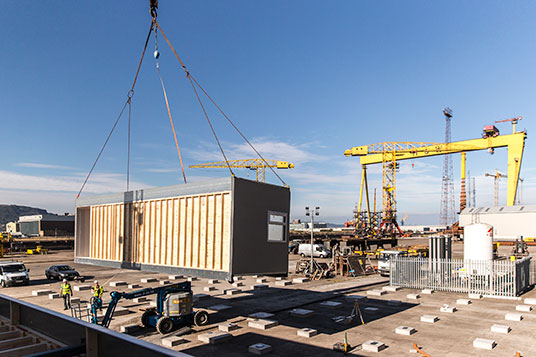Modular and offsite building is on the rise across the UK and beyond. According to the UK’s Autumn budget, modular building will be the Government’s construction method of choice by 2019 with defence, education, health, justice and transport departments all set to make greater use of modular construction techniques. Here Rory McGuigan, Head of Business Development at Western Building Systems breaks down some common misconceptions about modular building and highlights why the industry should embrace the important role it will play in the construction industry’s future.
Myth 1: “Modular buildings are temporary”
This is one of the biggest myths we hear repeatedly when meeting with architects, local authorities, and potential clients. For many, phrases like ‘prefab’ and ‘modular’ rouse memories of draughty temporary cabin structures utilised by schools and offices for extra space whilst wider construction projects were underway. This vision is a far cry from the state of the art modular building techniques available today. Many don’t realise that the same long-lasting materials that are used in traditional building are often used in modular building too. On average, our modular buildings are built to last at least 60 years – the exact same as modern buildings making use of reinforced concrete, glass curtain walls etc.
Myth 2: “Modular buildings leave little flexibility when it comes to design”
Another popular misconception of modular building is that the design process is extremely limited and that the modular structures all look the same. Innovation within the sector has sharply broadened the scale of design options and scope for originality. The use of canopies, multi-storey elements, striking cladding and facades as well as clever integration with traditional construction methods to create ‘hybrid’ buildings means that modular designs can look both futuristic and striking or blend effectively to look timeless.
Myth 3: “Modular buildings are lower quality”
There is a popular misconception that modular buildings make use of lower quality materials. Again, this couldn’t be further from the truth. In fact, modular construction techniques are being adopted world-wide for permanent buildings due to the superior quality they are able to achieve in considerably shorter time-frames compared to traditional methods. Modular buildings are subject to the same strict standards as traditional buildings, in fact, some of the off-site and modular regulations go above and beyond those enforced for traditional builds. In taking the majority of the construction process offsite, the modular building technique allows for greater levels of control, consistency and precision and is unaffected by external factors such as the weather.
Despite the common misconceptions surrounding it, modular construction is increasingly becoming the norm across all sectors. With the Government set to boost the sector even further in 2019, it’s time the construction industry embraced the modular and offsite revolution and dispelled the popular misconceptions of old.
Western Building Systems is a family-owned specialist construction business that celebrates its 35th anniversary in 2018. It has delivered a wide range of significant hybrid, offsite and traditional construction projects throughout the UK and Ireland within the health, education, industrial, commercial and residential sectors. Western’s ‘Single Source’ ability to design and manufacture all of its buildings’ key components including windows, internal door sets, furniture and walls gives it a unique competitive edge and ensures both consistent quality as well a controlled programme delivery.


